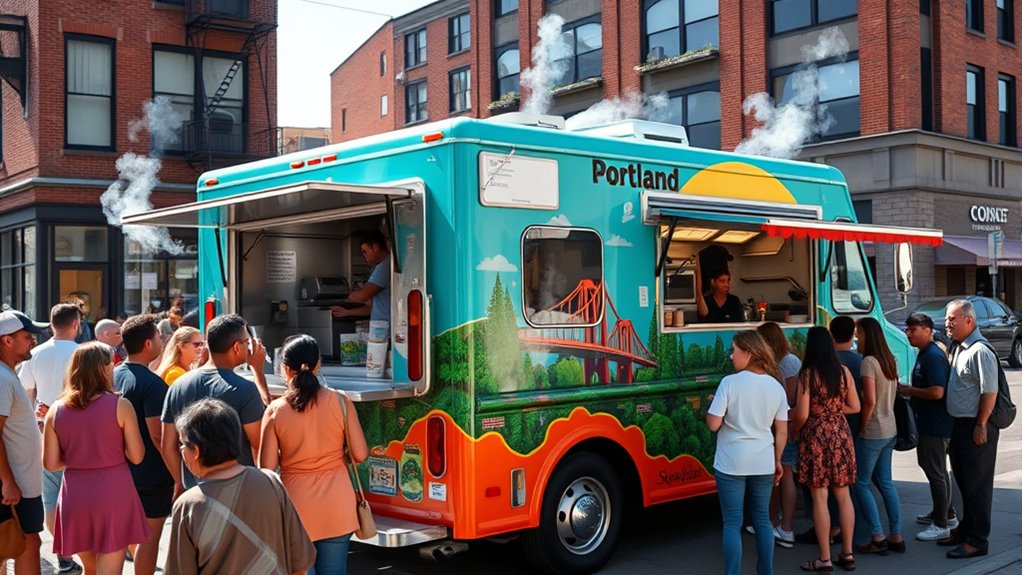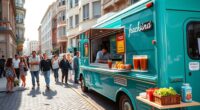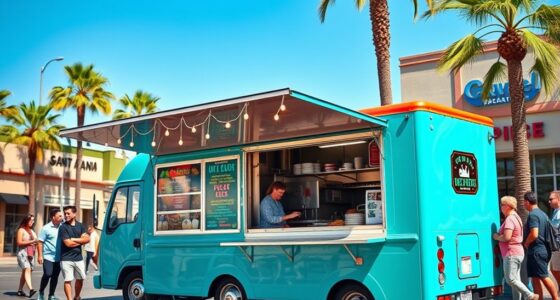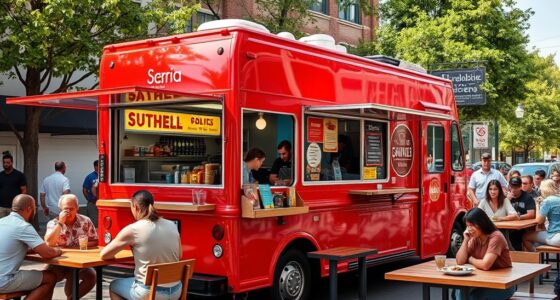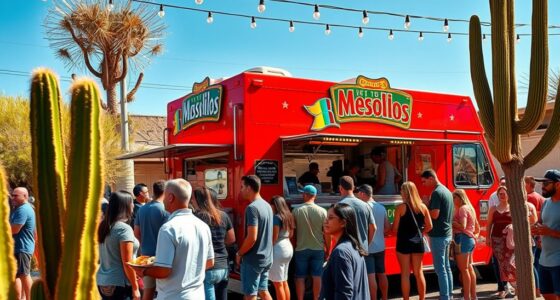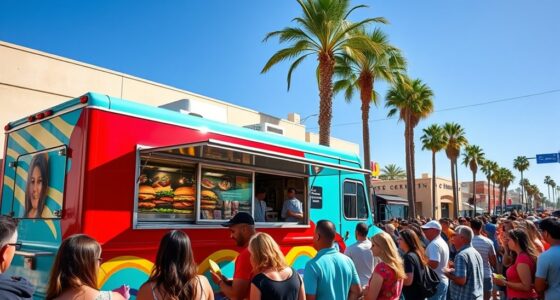Starting a food truck in Portland, OR, means tapping into a lively, diverse culinary scene. You’ll need to navigate local permits, health regulations, and zoning laws through online portals, while designing a standout brand with bold visuals. Choose a cost-effective kitchen setup, plan your menu with local ingredients, and invest in reliable technology. Engaging with Portland’s food events and community helps grow your presence. Keep exploring further steps to launch successfully in this dynamic city.
Key Takeaways
- Obtain necessary permits and licenses through Portland’s online application portals, ensuring compliance with local health and vending regulations.
- Develop a strong brand with bold visuals, a compelling story, and consistent messaging to stand out in Portland’s vibrant food scene.
- Choose cost-effective options like shared kitchens for licensing and design a functional, compliant kitchen layout for efficient operations.
- Secure startup capital via savings, loans, or investors, and invest in proper insurance coverage to protect your food truck business.
- Implement effective marketing strategies, including social media engagement, community participation, and menu highlighting local ingredients.
Vibrant Portland Food Scene
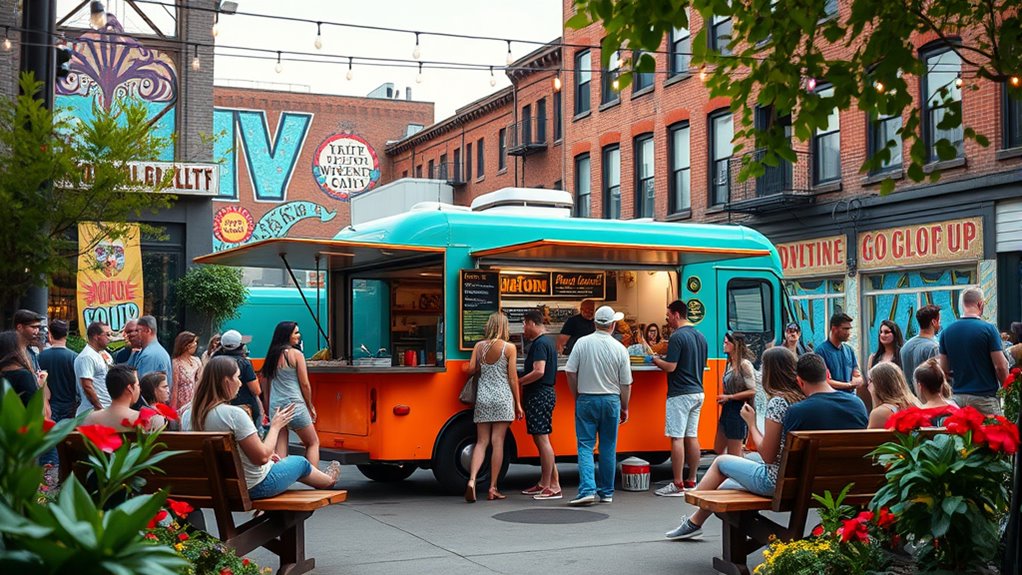
Portland’s food scene is undeniably vibrant, bustling with innovative chefs and diverse cuisines that cater to every palate. As a food truck owner, you’ll find that effective food truck branding helps you stand out amid this lively environment. Engaging with the local community is essential; it builds loyalty and helps your brand resonate with Portlanders. Participating in neighborhood events, collaborating with local businesses, and supporting community causes can boost your visibility. Portlanders value authentic connections and supporting local entrepreneurs, so your active involvement fosters trust and enthusiasm. The city’s dynamic food landscape offers countless opportunities for you to showcase your unique offerings while forging meaningful relationships with your audience. Strong branding combined with community engagement will set your food truck apart in this thriving culinary scene. Sustainable living practices can also be incorporated into your business to attract environmentally conscious customers and demonstrate your commitment to the city’s values.
Understanding Local Requirements
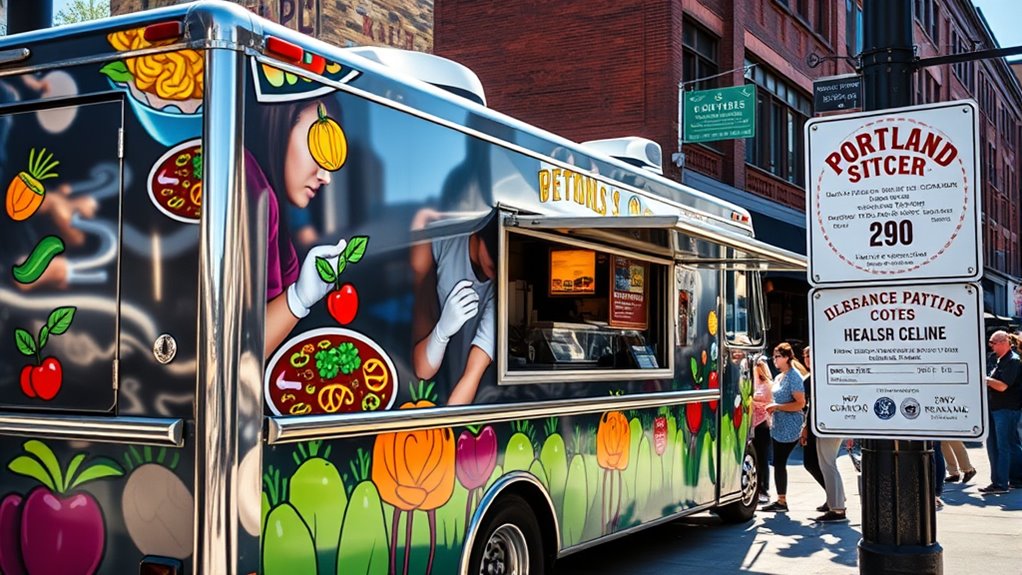
To operate a food truck in Portland, you need to navigate online permit application portals and stay up-to-date with sanitation protocols and record-keeping requirements. You’ll also want to familiarize yourself with designated street vending zones to ensure you’re parking legally. Understanding these local rules helps you avoid fines and keeps your business running smoothly. Additionally, it’s important to be aware of affiliate disclosure policies and privacy practices that may affect your online presence and customer interactions.
Online Permit Application Portals
Are you aware of how to navigate the online permit application portals for starting your food truck in Portland? The city’s digital licensing system streamlines the process, allowing you to apply for various permits from your computer. First, visit the city’s official website and locate the online permit portal. Here, you’ll find step-by-step instructions for submitting your online permit application. Make sure to gather all necessary documents beforehand, such as proof of insurance and vehicle information. Completing applications digitally saves time and provides instant updates on your permit status. Portland’s online permit system is designed to make licensing straightforward, so you can focus on launching your food truck without unnecessary delays. Familiarize yourself with the portal to ensure a smooth, efficient process.
Sanitation Protocols and Record-Keeping
Once you’ve completed your online permit application, paying close attention to sanitation protocols guarantees your food truck meets local health standards. To guarantee sanitation compliance, you must maintain proper records and follow strict procedures. Here are three key steps:
- Keep detailed logs of cleaning schedules and sanitation procedures.
- Regularly record food temperatures and storage conditions.
- Document staff training on hygiene and safety practices.
These records prove your commitment to health inspections and help identify areas for improvement. Staying organized and compliant reduces the risk of violations and guarantees your truck passes inspections smoothly. Remember, consistent sanitation practices are essential for protecting customer health and maintaining your license in Portland. Keeping accurate records is not only a legal requirement but also a critical part of your food truck’s success.
Designated Street Vending Zones
Understanding local requirements for designated street vending zones is essential for operating your food truck legally and smoothly in Portland. Portland has specific zoning regulations that determine where you can conduct street vending. These zones help manage foot traffic, ensure safety, and prevent conflicts with other businesses or residents. Before setting up, research the designated vending zones approved by the city and obtain any necessary permits. Some areas may have restrictions on hours or types of food allowed. By adhering to these zoning regulations, you avoid penalties and ensure a positive relationship with local authorities and the community. Knowing where you can sell food from your truck helps you plan effectively and operate without interruptions. Always check the latest city guidelines to stay compliant.
Setting Up Your Base of Operations
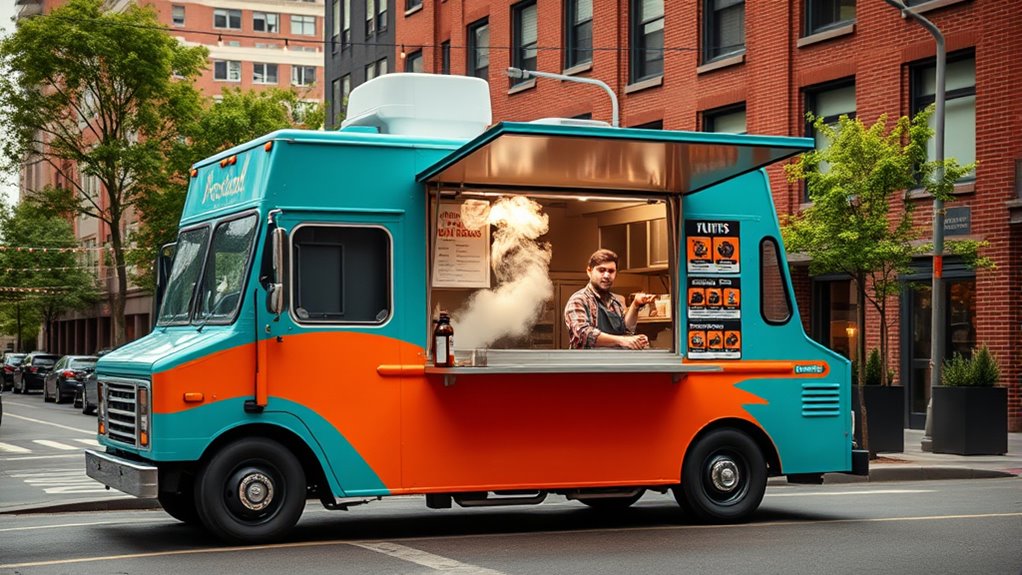
Choosing the right space for your base is essential, and shared kitchen licensing can be a smart option to reduce costs. You’ll also want to plan a custom kitchen layout that fits your menu and workflow. Additionally, considering the use of healthy ingredients like fresh vegetables and fruits can help you offer nutritious options that appeal to health-conscious customers. By exploring these options, you can set a solid foundation for your food truck operations.
Shared Kitchen Licensing Options
Setting up your food truck in Portland often starts with exploring shared kitchen licensing options, which can save you time and money. Shared kitchens, or kitchen co-ops, allow you to meet licensing requirements without building your own facility. By using a shared kitchen, you can:
- Comply with shared kitchen licensing laws efficiently
- Navigate kitchen co-op regulations smoothly
- Reduce startup costs substantially
These options give you access to fully equipped spaces, making it easier to meet health and safety standards. Make certain you understand the specific requirements for shared kitchen licensing in Portland, as regulations can vary. Choosing a reputable shared kitchen can streamline your setup process and help you focus on growing your food truck business.
Custom Kitchen Layout Planning
Designing your custom kitchen layout is a essential step in establishing a functional and efficient food truck. Focus on creating a layout that maximizes efficient space utilization, ensuring every inch serves a purpose. Start by mapping out your workflow, placing prep stations, cooking equipment, and storage logically to minimize movement. Prioritize safety and cleanliness, making sure there’s enough space for staff to work comfortably. Consider how you’ll access ingredients, dispose of waste, and clean surfaces. A well-planned custom kitchen layout helps streamline operations, reduces clutter, and improves turnaround times. Keep in mind the truck’s size restrictions and local health regulations. With a thoughtful design, your food truck will operate smoothly and meet your business needs efficiently from the very first day.
Budgeting and Financing Your Food Truck
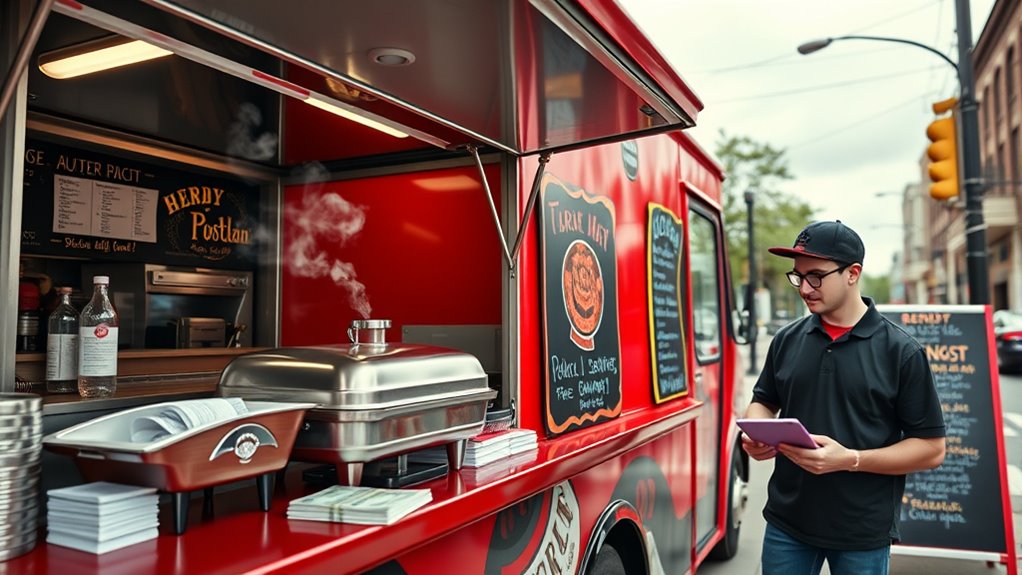
To get your food truck rolling, you need to plan for costs like vehicle customization and initial setup. You’ll also want to explore different sources of startup capital, such as loans or investors. Don’t forget to budget for liability coverage to protect your business and assets. Additionally, implementing smart marketing strategies can help you attract more customers and grow your presence in Portland.
Initial Vehicle Customization Costs
Initial vehicle customization costs typically range from $20,000 to $75,000, depending on your truck’s size, the equipment needed, and the level of customization. When planning your budget, focus on accurate cost estimation for the vehicle modification process. Key factors influencing costs include:
- The complexity of the vehicle customization, including kitchen layout and equipment.
- The choice of high-quality, durable appliances.
- Additional features like branding, signage, and interior design.
Startup Capital Sources
Securing the right startup capital is a vital step in bringing your food truck vision to life. To do this, explore various funding options such as personal savings, bank loans, or credit lines. You might also consider seeking investment strategies like partnerships or angel investors who believe in your concept. Crowdfunding platforms can help you raise funds while building a community of supporters. It’s imperative to evaluate each funding source carefully, considering repayment terms and equity sharing. Creating a detailed budget will help you identify how much capital you need and guide your funding efforts. Remember, a solid financial foundation increases your chances of success, so take time to research and choose the best funding options tailored to your specific needs.
Liability Coverage for Food Trucks
Understanding liability coverage is essential when budgeting and financing your food truck, as it protects you from potential legal and financial risks. Proper food truck insurance, including liability coverage, shields you from accidents, injuries, or property damage. To guarantee you’re adequately protected, consider these key points:
- Shop around for policies that specifically cover food truck operations.
- Understand the limits of liability coverage to match your business size.
- Regularly review and update your coverage as your business grows.
Liability coverage is a crucial part of your overall insurance plan, helping you avoid significant out-of-pocket expenses. Investing in the right food truck insurance ensures you stay protected, allowing you to focus on serving great food without worry.
Designing Your Menu and Pricing Strategy
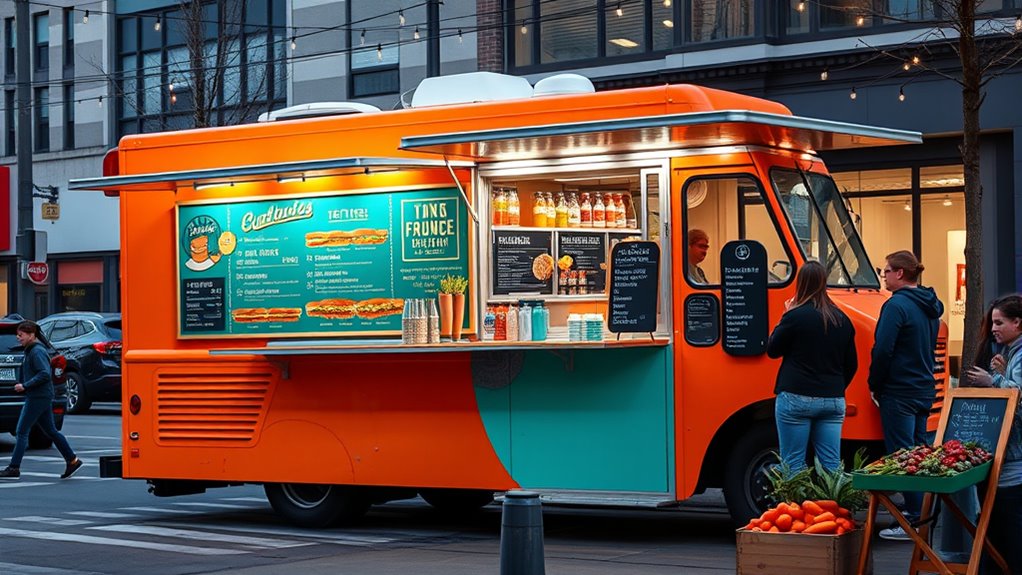
When designing your menu, choosing locally sourced ingredients can boost freshness and appeal to Portland customers. You also need to balance ingredient costs with your menu prices to maintain healthy profit margins. By carefully managing these factors, you’ll create a menu that’s both attractive and sustainable. Incorporating high-quality supplies can further enhance your offerings and customer satisfaction.
Locally Sourced Ingredient Selection
Choosing locally sourced ingredients can substantially elevate your menu and influence your pricing strategy. When sourcing farmers, you guarantee ingredient freshness, which enhances flavor and quality. To make the most of this, focus on:
- Building relationships with nearby farmers to secure consistent, fresh supplies.
- Highlighting ingredient freshness in your menu descriptions to attract customers.
- Pricing dishes based on the quality and uniqueness of locally sourced ingredients, which can command higher prices.
Cost Control and Menu Margins
Leveraging locally sourced ingredients offers a chance to create unique, high-quality dishes that can justify premium pricing. To maintain menu profitability, you need to carefully control your food cost by balancing ingredient quality with cost efficiency. Start by accurately calculating the food cost for each item, ensuring prices cover expenses while remaining attractive to customers. Use portion control and streamline your menu to focus on high-margin dishes. Regularly review sales data to identify best performers and eliminate low-margin items. Pricing strategies should reflect ingredient costs, prep time, and market demand. By monitoring your food cost and adjusting menu items accordingly, you can maximize profit margins without compromising quality, ensuring your food truck stays financially healthy and competitive in Portland’s bustling food scene.
Technology and Operations

Using wireless card readers and mobile apps can streamline your transactions and reduce wait times. A mobile POS system helps you track sales and inventory in real-time, making operations more efficient. Incorporating these technologies allows you to stay organized and better serve your customers on the go.
Wireless Card Readers and Apps
Have you ever wondered how food trucks streamline their payment processes? Wireless card readers and apps make it simple. They enable contactless payments, speeding up transactions and reducing lines. When choosing a system, consider these key benefits:
- Seamless integration with inventory management to track sales in real-time.
- Compatibility with multiple payment methods, including tap and chip.
- Ease of use, allowing quick setup and minimal training.
Using these tools, you’ll improve customer experience and efficiency. Wireless systems also reduce cash handling risks and provide detailed sales reports. By leveraging this technology, you keep your operation agile, ensuring smooth service even during busy hours. Ultimately, investing in reliable wireless card readers and apps helps you stay competitive and organized in Portland’s bustling food scene.
Mobile POS and Tracking
Ever wondered how food trucks keep track of sales and manage operations seamlessly on the go? Mobile POS systems make this possible by integrating digital payments, so customers can pay quickly with credit cards or mobile wallets. These systems automatically record each transaction, simplifying your sales tracking. They also help you with inventory management by updating stock levels in real-time, so you know exactly what’s selling and what needs restocking. With mobile POS and tracking, you can monitor sales data remotely, identify popular items, and optimize your menu on the fly. Plus, these tools streamline daily operations, reduce errors, and improve customer service. Overall, investing in a reliable mobile POS system keeps your food truck efficient, profitable, and ready to serve Portland’s busy food scene.
Marketing and Growing Your Presence
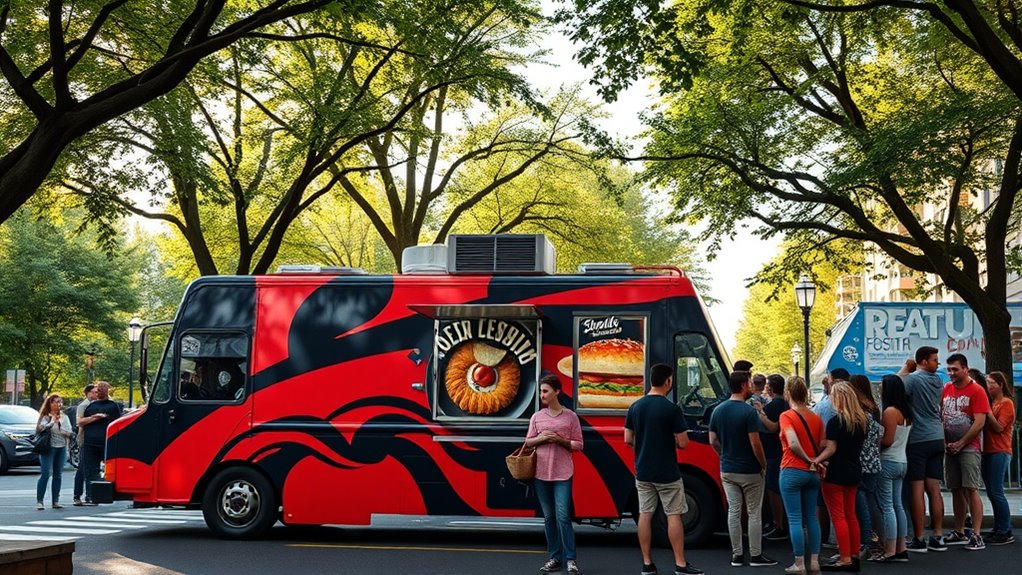
Attending popular Portland food truck events and festivals can boost your visibility and attract new customers. These gatherings give you a chance to showcase your menu and connect with a wider audience. Leveraging these opportunities helps grow your presence in the local food scene.
Popular Portland Food Truck Events
Portland’s vibrant food truck scene thrives thanks to a variety of popular events that draw in crowds and boost your presence. Participating in these events helps strengthen your food truck branding and builds customer loyalty. To maximize your impact, focus on these key strategies:
- Choose events with high foot traffic, like food truck festivals and neighborhood gatherings.
- Create eye-catching branding that stands out in a crowded space.
- Engage with customers to foster loyalty through personalized service and social media follow-ups.
Engaging Portland Food Festivals
Participating in Portland food festivals offers a prime opportunity to showcase your food truck to a large, engaged audience. To maximize your impact, focus on customer engagement by interacting with festival-goers, sharing your story, and offering samples. This helps build loyalty and spreads word-of-mouth buzz. Make sure your food truck is well-maintained; good food truck maintenance ensures smooth operations and avoids breakdowns that could hurt your reputation. Use social media before and after events to invite new customers and share your festival experience. Engaging directly with attendees allows you to gather feedback and tailor your offerings. By actively participating and maintaining your truck, you’ll grow your presence in Portland’s vibrant food scene and attract repeat customers.
Master Portland’s Vibrant Scene
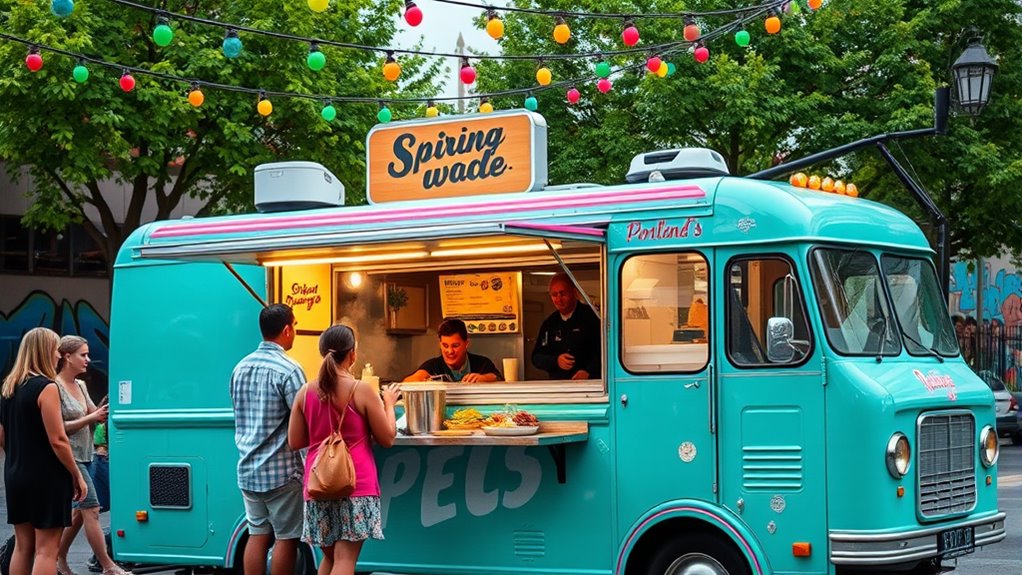
To truly master Portland’s vibrant food truck scene, you need to plunge into its diverse array of flavors and innovative concepts. Focus on strong food truck branding to make your truck memorable and recognizable. Use social media marketing strategically to engage with your audience and build a loyal following. Here are three key tips:
Master Portland’s food truck scene with bold branding and strategic social media engagement.
- Develop a compelling brand story that resonates locally.
- Post consistently across platforms like Instagram and Facebook.
- Share behind-the-scenes content and customer testimonials.
Frequently Asked Questions
What Permits Are Required for Night-Time Food Truck Operations?
You’ll need food truck licensing and nighttime permits to operate your food truck at night in Portland. Apply for a mobile food unit license through the Portland Health Department, ensuring your truck meets health and safety standards. For nighttime operations, obtain specific nighttime permits from the city’s licensing office. These permits often require proof of insurance, a detailed operational plan, and compliance with local noise and lighting regulations to keep your business legal and running smoothly.
How Do Weather Conditions Affect Food Truck Scheduling in Portland?
Weather disruptions in Portland can markedly impact your food truck schedule. Rain, wind, and colder temperatures often lead to lower customer turnout, so you should adjust your hours and locations accordingly. During winter, plan for seasonal changes by shifting to indoor events or covered spots. Keep an eye on weather forecasts daily, and develop seasonal planning strategies to stay flexible and maximize sales despite unpredictable weather conditions.
Are There Specific Health Codes Unique to Portland’s Food Trucks?
Yes, Portland’s food trucks must adhere to specific health code inspections and food safety regulations. You’ll need to obtain a food handler’s permit and verify your truck passes regular health inspections. The city emphasizes proper sanitation, safe food storage, and temperature controls. Staying compliant with these regulations not only keeps your truck legally open but also guarantees your customers’ safety and satisfaction, building trust in your brand.
What Local Food Trends Should I Incorporate Into My Menu?
You should embrace Portland’s vibrant food scene by incorporating local ingredients and exploring food fusion trends. Think fresh, seasonal produce combined with international flavors to create exciting menu items that catch the neighborhood’s eye. Portlanders love innovative takes on comfort foods, so experiment with sustainable seafood, farm-to-table veggies, and bold spice blends. By blending local pride with creative flair, your food truck will resonate with the city’s adventurous palate.
How Can I Partner With Local Events for Increased Exposure?
You can boost exposure by forming community collaborations and sponsoring local events. Reach out to event organizers to become a food vendor or sponsor, offering to provide food at festivals, farmers markets, or community gatherings. This not only increases visibility but also helps build relationships with residents. Partnering through community collaborations and event sponsorships allows you to showcase your menu to a wider audience while supporting local initiatives.
Conclusion
Starting your food truck in Portland is like planting a seed in a city bursting with flavor and energy. With each step, you’ll nurture your dream into a thriving, rolling kitchen that captures the heart of Portland’s vibrant scene. Embrace the adventure, adapt to the rhythm of the city, and let your passion serve up unforgettable bites. Before you know it, your food truck will be a beloved flavor beacon on Portland’s bustling streets.
